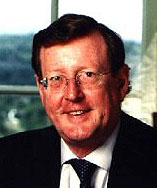For some reason I’m having a conversation about the evolution of podcasting in Zhasper’s blog.
I look like David Trimble
Apparently I look like David Trimble (pictured right), the Northern Ireland politician and joint winner of the 1998 Nobel Peace prize. Well, 67% like him anyway, according to face recognition website MyHeritage.com.
Here’s the deal. You give them your photo, they match it against their database of celebrities and pick the closest. And in return, they get to test their face recognition software — and along the way build up a database of over a million faces (so far) matched to names and email addresses and family connections. Neat eh?
A not a single privacy concern, not one. Because their privacy policy includes the magic words saying that they’re firmly committed to protecting your privacy. So it must be true.
I also look 61% like actor Anthony Hopkins, 56% like American poet Ezra Pound, and 55% like actors Annette Bening (should I frock up now?) and Hugh Grant (should he frock up now?).
And 53% like Boris Karloff, which doesn’t thrill me at all.
Police Security Blunder reveals Journalists’ Stupidity
The Sydney Morning Herald report that a NSW Police security glitch exposed “email passwords” is misleading. But it provides useful lessons in password choice — hackers, relax, you’ve got it easy! — website security and media management.
Continue reading “Police Security Blunder reveals Journalists’ Stupidity”
Daylight Saving Chaos
Which “genius” decided to extend daylight saving to prevent confusion during the Commonwealth Games? It’s already proving a problem — even more-so than first thought. Seasoned systems administrators are having trouble today with Windows, Mac OS X and Linux computers. When people return to work tomorrow it’ll be even worse…
33 Days of Wiki Inspiration
A wiki is a website which allows anyone to add, remove, or otherwise edit content, quickly and easily. The best-known wiki is Wikipedia, an open encyclopedia which anyone can contribute to.
But wikis are also good in a business context for maintaining documentation — because anyone can update the documentation immediately.
To show you what’s possible, Eastwikkers series has just started a series called “33 Wikis,” featuring best practices in wiki-based collaboration.
Each day — for 33 days — we will focus on one wiki, and we will briefly describe what the wiki is for, why we like it, and we can all learn from it.
I’ll be following it myself, and reporting back at the end.
[Update 16 January 2008: This page is still getting hundreds of visitors a month. I’m curious. How did you get to this page? What brought you here? And while you’re here, do feel free to look around and maybe even post a few comments.]
Wrapping up the johnhowardpm.org takedown
Melbourne IT now admits its takedown of satirical website johnhowardpm.org was “badly handled”. In an interview on ABC Radio National, Bruce Tonkin, CTO of Melbourne IT, also indicated that it may have been a mistake to take the Prime Minister’s office at their word.
As I write this, johnhowardpm.org is back online, redirected to Richard Neville’s main website.
Tim Longhurst has already written an excellent factual summary, including links to source material. So I’ll just look at three questions…
1. What crime, exactly?
The PM’s office involved the Australian High Tech Crime Centre (AHTCC). Their website describes “high tech crimes” as including:
- computer intrusions (e.g. malicious hacking)
- unauthorised modification of data, including destruction of data
- denial-of-service (DoS) attacks
- and the creation and distribution of malicious software (e.g. viruses, worms, trojans)
I don’t see how Richard Neville’s spoof fits any of those.
2. Isn’t it “Fair Usage”?
Neville’s one error may have been using elements from the real John Howard website. Despite what many people believe, Australian law does not recognise copying for satirical purposes as “fair dealing” — only for serious criticism and review.
The most recent case was TCN Channel 9 Pty Ltd sueing Ten network program The Panel over their use of Nine footage. The Melbourne University Law Review has written a detailed analysis of The Panel case, calling it “a real pea souper”. [Thanks to Jan Whitaker for the pointer.]
3. Were “favours owed”?
After all, ABC TV’s Four Corners questioned the allocation of shares in Melbourne IT’s lucrative float. Given that Melbourne IT was spun out of the University of Melbourne, a Liberal stronghold that’s not too long a stretch.
Was some Liberal conspiracy at play?
I doubt it. This was the first time Melbourne IT had shut down a satirical website in ten years of operations. They probably didn’t have a procedure, and were spooked by the call from the AHTCC.

